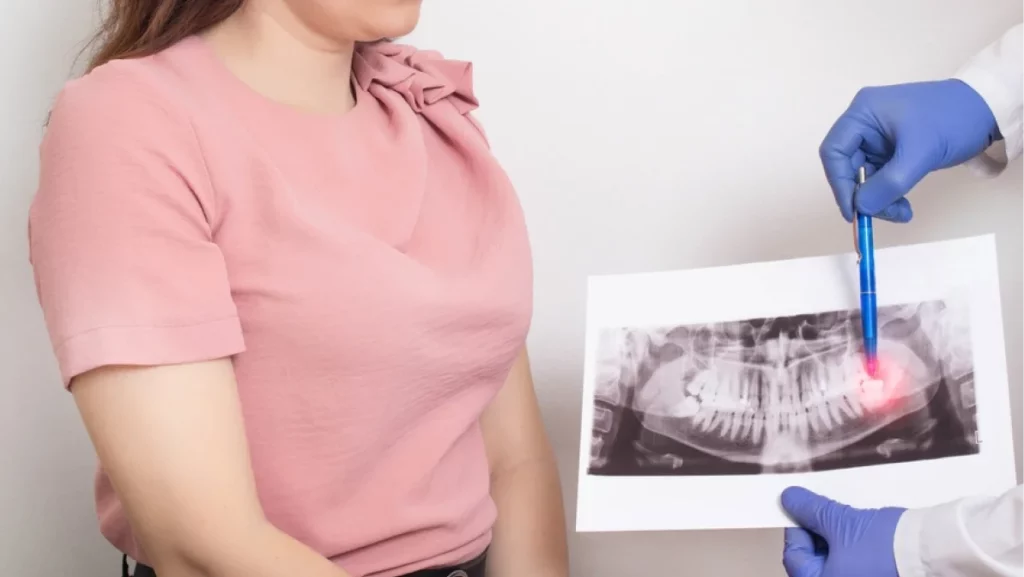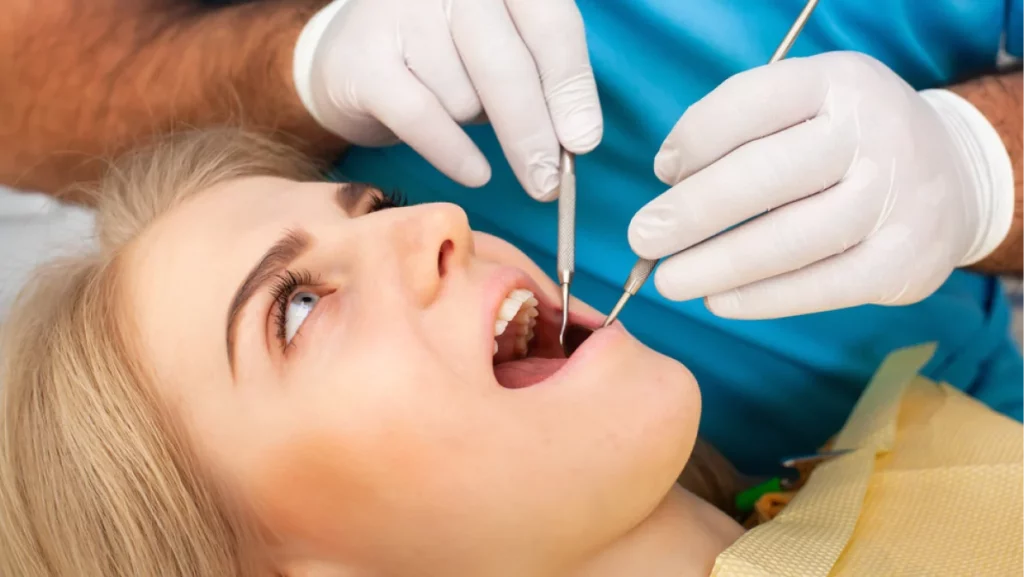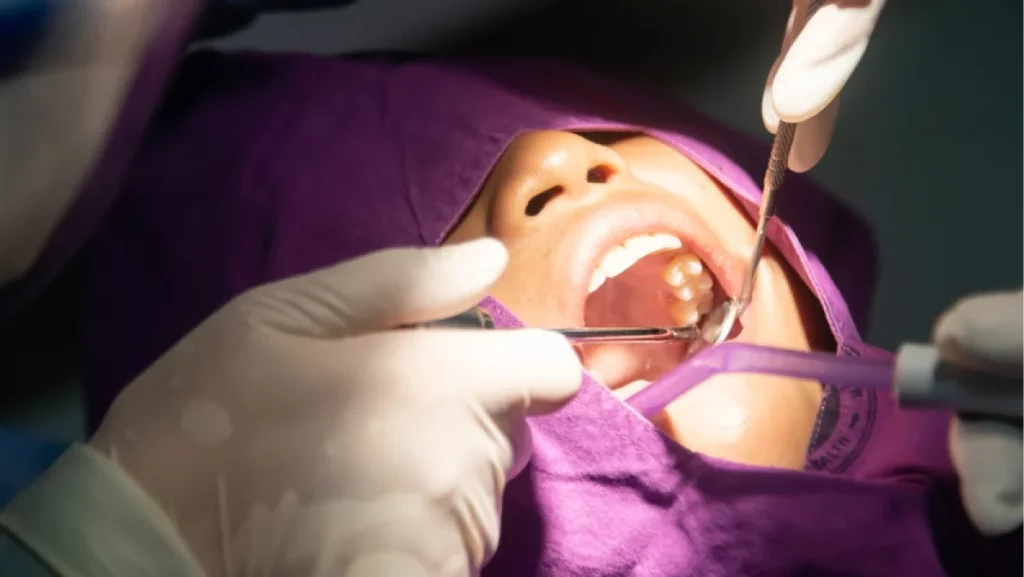Wisdom teeth removal is a common dental procedure that helps prevent pain, crowding, and oral health issues caused by impacted or misaligned third molars. While some people experience no problems when these teeth erupt, many face complications that require timely treatment from a skilled dental professional.
Understanding the process, knowing what to expect before and after wisdom teeth removal, and following the right aftercare steps can make recovery smoother and more comfortable. This guide covers everything from signs you may need extraction to what to eat after wisdom teeth removal.
When Is Wisdom Teeth Removal Necessary?
Not everyone requires wisdom teeth removal, but certain signs and conditions indicate it may be the best solution for your oral health.
Common Signs & Symptoms
Wisdom teeth can cause discomfort when they erupt incorrectly. Symptoms include jaw pain, swollen gums, and difficulty opening the mouth. Bad breath and an unpleasant taste in the mouth may also occur if food and bacteria become trapped between the teeth.
Medical Reasons for Extraction
Dentists recommend removal when wisdom teeth are impacted, cause cysts or infections, or damage neighboring teeth. Extraction may also be necessary if they create crowding that affects orthodontic alignment.
How Wisdom Teeth Are Removed: Techniques We Use

Wisdom teeth removal techniques depend on the tooth’s position and the complexity of the case.
Simple vs. Surgical Extraction
A simple extraction works for teeth that have fully erupted. Surgical extraction is required for impacted teeth that are partially or fully beneath the gums. Surgical cases often involve a small incision and, in some instances, removal of bone tissue.
Step-by-Step Overview of the Procedure
The dentist begins by administering local anesthesia, sedation, or general anesthesia. For surgical extractions, an incision is made in the gum, and the bone covering the tooth may be removed. The tooth is then extracted whole or in sections, followed by cleaning and suturing the site.
What to Do After Wisdom Teeth Removal
Following the right aftercare instructions is crucial for preventing complications and promoting healing.
Wisdom Teeth Removal Aftermath: What to Expect
After wisdom teeth removal, patients often experience swelling, mild bleeding, and discomfort for the first few days. Bruising may also occur. These effects gradually subside with proper care.
Recovery Timeline and Milestones
Most patients recover within one to two weeks. Swelling usually peaks within 48 hours and decreases by day four. Sutures may dissolve within a week, and normal eating can often resume after ten days.
Managing Pain and Swelling
Use ice packs on the outside of your cheek for 15–20 minutes at a time during the first 24 hours to reduce swelling. Over-the-counter or prescribed pain relievers can help manage discomfort.
Oral Hygiene After Extraction
Keep your mouth clean by gently rinsing with warm salt water starting 24 hours after surgery. Avoid brushing directly over the extraction site for the first few days to prevent irritation.
Avoiding Common Complications
Refrain from smoking, drinking through a straw, or engaging in strenuous activity during the first few days. These actions can dislodge the blood clot and cause dry socket, delaying healing.
Managing Pain and Discomfort After Wisdom Teeth Removal

Proper pain management ensures a smoother recovery and reduces complications.
Over-the-Counter Pain Relief
Medications like ibuprofen or acetaminophen can help control mild to moderate pain. Follow the recommended dosage and timing to maintain comfort.
Prescription Medications
For more extensive procedures, your dentist may provide stronger pain medications. Use them exactly as prescribed and report any side effects promptly.
Natural Pain Relief Techniques
Cold compresses applied to the outside of the cheek can reduce swelling and numb discomfort. Gentle rest and elevating your head while sleeping also help manage pain.
When to Contact Your Dentist
If pain is severe, persistent, or accompanied by unusual swelling or bleeding, contact your dentist immediately. Prompt attention prevents complications like infection or dry socket.
Is wisdom teeth removal a surgery?
Yes, wisdom teeth removal is considered a form of oral surgery because it involves making an incision in the gums to remove impacted or problematic teeth.
What to Eat After Wisdom Teeth Removal

Choosing the right foods supports healing and prevents irritation to the surgical site.
Best Foods for a Smooth Recovery
Soft foods like mashed potatoes, yogurt, applesauce, and smoothies are gentle on the gums and require little to no chewing, making them perfect for the first few days after surgery. Soups and broths also provide warmth, comfort, and essential nutrients without irritating the extraction site.
Eating Tips to Promote Healing
Stick to foods that are soft, mild in flavor, and easy to swallow to prevent irritation. Chew on the opposite side of your mouth, and rinse gently with lukewarm salt water after eating to keep the area clean.
Cold Foods to Reduce Swelling
Cold, soft foods such as ice cream, frozen yogurt, and chilled smoothies can help reduce swelling and provide relief from discomfort during the first 48 hours. Avoid adding crunchy toppings or ingredients that could get stuck in the extraction site.
Nutrient-Rich Choices for Recovery
Protein-rich foods like scrambled eggs, blended vegetable soups, and avocado can support tissue repair and boost your immune system. Adding soft fruits, leafy greens, or protein powder to smoothies is another easy way to enhance your nutrition during recovery.
Meal Planning for the First Week
Having pre-prepared, soft meals ready before your wisdom teeth removal can save you time and effort. Stock up on easy-to-eat foods so you can focus on rest and healing instead of cooking.
Foods to Avoid After Wisdom Teeth Removal
Some foods can slow healing or cause discomfort.
Hard and Crunchy Foods
Chips, nuts, and crusty bread can scratch the healing gums or dislodge the blood clot, increasing the risk of dry socket. These textures also require more chewing, which can strain the jaw and cause discomfort. Wait until your oral surgeon confirms it’s safe to resume eating these items.
Sticky and Chewy Foods
Caramel, gum, and sticky candies can pull at the surgical site and disturb the healing process. These foods also tend to stick to teeth and gums, making it harder to maintain proper oral hygiene. This can lead to bacterial buildup and slow down recovery.
Spicy and Acidic Foods
Hot peppers, citrus fruits, and vinegar-based sauces may irritate sensitive gum tissue during the healing phase. The strong flavors and acids can cause stinging sensations and prolong inflammation. Opt for mild, soft foods instead until your gums are fully healed.
Lifestyle Habits That Support Recovery After Wisdom Teeth Removal
Your daily habits can significantly influence your recovery time.
Rest and Sleep for Optimal Healing
Aim for at least seven to eight hours of rest each night to give your body the energy it needs to heal. Sleep helps reduce inflammation and allows the immune system to focus on repairing tissues. Elevating your head with an extra pillow can also minimize swelling.
Gentle Oral Care Practices to Protect the Extraction Site
Use a soft-bristle toothbrush to clean your teeth while avoiding the extraction area. For the first 24 hours, skip mouth rinses to prevent dislodging the blood clot. After that period, gentle saltwater rinses can help keep the area clean without causing irritation.
Activities to Avoid in the First Week
Stay away from strenuous exercise, heavy lifting, or any activity that increases your heart rate for the first few days. These actions can cause bleeding, swelling, or even delay clot formation at the surgical site. Instead, focus on light movements and prioritize rest until your dentist or oral surgeon clears you for normal activity.
Wisdom Teeth Removal Cost: What to Expect
The price varies depending on the complexity of the procedure and other factors.
Factors That Affect the Cost
The number of teeth removed, the type of anesthesia, and surgical difficulty influence the wisdom teeth removal cost. Additional expenses may include X-rays and follow-up visits.
Transparent Pricing at Brownstone Dental
Brownstone Dental in Houston provides patients with clear, upfront pricing. The team provides detailed treatment plans so patients understand every cost before proceeding.
Why Choose Brownstone Dental for Wisdom Teeth Removal?
Expertise and personalized care make all the difference in comfort and results.
Experienced Dental Surgeons in Houston
Our skilled team at Brownstone Dental, led by Dr. Saif Shere, DMD, provides precise and safe wisdom teeth removal services for patients. Dr. Shere’s experience helps reduce discomfort and promotes a faster, smoother recovery.
Personalized Aftercare and Support
Patients receive tailored instructions and ongoing support after wisdom teeth removal. The staff remains available to answer questions and address concerns during recovery.
Schedule Your Wisdom Teeth Consultation Today
Wisdom teeth removal plays a key role in maintaining long-term oral health. With proper care and guidance from an experienced dental team, patients can navigate the procedure and recovery with confidence, ensuring healthier teeth and a more comfortable smile. Planning and following post-procedure instructions help achieve the best possible results.
Dr. Saif Shere, DMD from Brownstone Dental, offers exceptional wisdom teeth removal in Houston, along with advanced cosmetic dentistry services. Located at 9824 Fondren Rd, Houston, TX 77096, Brownstone Dental provides top-tier care tailored to each patient’s needs. Schedule your consultation today!